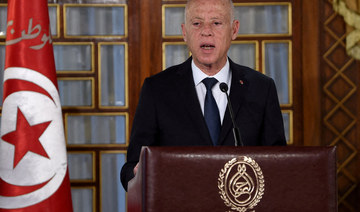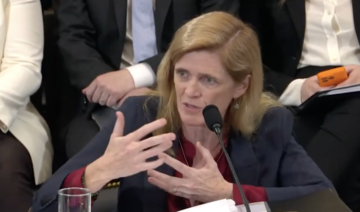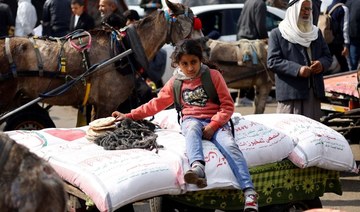TUNIS: Tunisian President Kais Saied faced growing pressure on Tuesday from judges, the UN and world powers after he scrapped a key judicial watchdog, triggering renewed accusations he is moving toward authoritarian rule.
Saied dissolved the Supreme Judicial Council on Sunday, months after sacking the government and seizing wide-reaching powers in the North African country, often lauded as the only democracy to emerge from the 2011 Arab revolts.
The former law professor had long inveighed against the council, accusing members of blocking investigations into the 2013 assassinations of leftist political figures Chokri Belaid and Mohamed Brahmi.
He had also accused his nemesis, the Islamist-inspired Ennahdha party that had played a central role in Tunisian politics for the decade between the revolution and Saied’s power grab, of infiltrating the body.
The president, who has put fighting corruption at the heart of his program, insisted Monday that he would “never interfere with the judiciary” and that removing the judicial council was necessary as Tunisians wanted the country “cleansed.”
But his removal of the council, set up in 2016 to shield judges from government influence, sparked renewed anger from critics who say he is installing a new dictatorship, 11 years after the fall of dictator Zine El Abidine Ben Ali.
Those fears have been fueled by the increasing use of military courts to try civilians.
In Tunis, the envoys of the G7 nations and the European Union said they were “deeply concerned” about Saied’s move against the council, “whose mission is to ensure the sound functioning of the justice system and respect for its independence.”
“A transparent, independent and efficient judiciary and the separation of powers are essential for a functioning democracy that serves its people,” they said.
Amnesty International said Saied’s “attack” on the body was “a grave threat to fair trial rights.”
“If the President enacts a decree to dissolve or suspend the institution, it will sound the death knell for judicial independence in the country,” said the rights group’s regional director Heba Morayef.
That came hours after Washington — which has often given Saied the benefit of the doubt following similar moves — also voiced its concern, calling an independent judiciary “a core element of an effective and transparent democracy.”
“It is essential that the government of Tunisia holds its commitments to respect the independence of the judiciary, as stipulated in the constitution,” said State Department spokesman Ned Price.
A month after his July 25 power grab, Saied had given himself new powers effectively allowing him to rule by decree and suspending parts of the 2014 constitution — a document he has since vowed to replace.
His latest move gets rid of a body that had been mandated to ensure the functioning of justice, keep the judiciary independent and appoint judges.
On Monday, police blocked access to the council’s headquarters, preventing members and staff from entering.
The body’s president Youssef Bouzakher called the move “illegal,” and on Tuesday the Association of Tunisian Magistrates said it was “a flagrant violation of the separation of powers” that would be ensured in a “democratic regime.”
The association also announced a judges’ strike “at all courts across the country on Wednesday and Thursday” as well as a protest outside the council’s offices on Thursday.
Ennahdha said Saied’s decision showed he was “trying to take control of the judicial apparatus to use it to eliminate his political rivals.”
Saied’s move also sparked criticism from the UN in Geneva, where High Commissioner for Human Rights Michelle Bachelet called it “a big step in the wrong direction.”
Dissolving the body “is in clear violation of Tunisia’s obligations under international human rights law,” she said.
She also pointed out that the judicial council’s establishment in 2016 had been seen as a major advance for the rule of law, separation of powers and the independence of the judiciary in Tunisia.
Bachelet also decried online hate campaigns and threats directed at the council’s members, and called for all necessary measures to be taken to ensure their safety.
She said that since July, “there have been increasing attempts to stifle dissent, including through harassment of civil society actors.”
UN, Western envoys urge Tunisia to restore judicial watchdog
https://arab.news/9j5m2
UN, Western envoys urge Tunisia to restore judicial watchdog

- Saied dissolved the Supreme Judicial Council on Sunday
- The former law professor had long inveighed against the council, accusing members of blocking investigations
US congressman praises heckling of war protesters, including 1 who made monkey gestures at Black woman

JACKSON, Mississippi: Israel-Hamas war demonstrations at the University of Mississippi turned ugly this week when one counter-protester appeared to make monkey noises and gestures at a Black student in a raucous gathering that was endorsed by a far-right congressman from Georgia.
“Ole Miss taking care of business,” Republican US Rep. Mike Collins wrote Friday on the social platform X with a with a link to the video showing the racist jeers.
The Associated Press left voicemail messages for Collins on Friday at his offices in Georgia and Washington and sent an email to his spokesperson, asking for an explanation of what Collins meant. There was no immediate response.
The taunting brought sharp criticism on and off campus.
“Students were calling for an end to genocide. They were met with racism,” James M. Thomas, a sociology professor at the University of Mississippi, wrote Friday on X.
The Rev. Cornell William Brooks, a former president and CEO of the NAACP and professor at the John F. Kennedy School of Government at Harvard University, wrote on X that a white man mocking a Black woman as a monkey “isn’t about ‘Stand With Israel’ or ‘Free Palestine.’ This is protest as performative racism.”
Collins was first elected to Congress in 2022 and made several social media posts criticizing campus protests.
Nobody was arrested during the demonstration Thursday at the University of Mississippi, where hecklers vastly outnumbered war protesters. According to a count by AP, more than 2,400 arrests have occurred on 46 US university or college campuses since April 17 during demonstrations against the war.
The student newspaper, The Daily Mississippian, reported about 30 protesters on the Oxford campus billed themselves as UMiss for Palestine. Videos and photos from the event showed the protesters were in a grassy area near the main library, blocked off by barriers erected by campus security.
They chanted “Free, free Palestine,” and carried Palestinian flags and signs with slogans including, “Stop the Genocide” and “US bombs take Palestine lives.”
Student journalist Stacey J. Spiehler shot video that showed campus police officers and the dean of students standing between anti-war protesters and hecklers. After the Black woman protesting the war had what appeared to be a heated exchange of words with several white hecklers, one of the men made the monkey gestures and noises at her.
About 76 percent of the university’s students were white and about 11 percent were Black in 2022-23, the most recent data available on the school’s website.
University of Mississippi Chancellor Glenn Boyce said the school is committed to people expressing their views. He said some statements made on campus Thursday were “offensive and unacceptable.”
Republican Gov. Tate Reeves reposted a video on X that showed counter-protesters on the campus singing “The Star-Spangled Banner.”
“Warms my heart,” Reeves wrote. “I love Mississippi!”
Sebastian Munoz shoots 6-under 65 to lead LIV Singapore after the first round

SINGAPORE: Sebastian Munoz of Colombia shot a 6-under 65 on Friday to lead after the first round of the LIV Golf tournament in Singapore.
Six players were a shot back after rounds of 66 at the Sentosa Golf Club in Singapore — Thomas Pieters, Brooks Koepka, Cameron Tringale, Abraham Ancer, Martin Kaymer and Kevin Na.
Munoz, who opened with a 1-over 72 in his first round a week ago in Australia, found himself back on track in Singapore.
“Really happy where the game is right now and kind of trending,” Munoz said.
Koepka, who started on the third hole in the shotgun-style format, birded five of his first seven holes in usual steamy conditions in Singapore.
After being asked if he played better in warm-weather climates — he has won twice in Saudi Arabia in 2022 and 2023 at Royal Greens Golf Club in King Abdullah Economic City near Jeddah — Koepka said “I really don’t care where it is, as long as I win.”
Brendan Steele, last week’s LIV winner in Adelaide, Australia, was three shots off the lead after a 68.
Jon Rahm, who has yet to win after joining LIV in December, was four strokes behind following a 69. Rahm, however, is the only player to have finished in the top 10 in all six events in 2024.
The next LIV tournament is June 7-9 in Houston, Texas.
Luton gains valuable point from home draw with Everton

- Luton remained third to last
LUTON, England: Luton got a valuable point in its fight to avoid relegation after a hard-fought 1-1 draw with visiting Everton in the English Premier League on Friday.
Luton remained third to last, below 17th-placed Nottingham Forest only on goal difference. Luton has two games left. Everton has already guaranteed its survival.
Everton took the initiative when Dominic Calvert-Lewin scored from the penalty spot after 24 minutes.
A video review ruled Teden Mengi held Jarrad Branthwaite, and Calvert-Lewin notched his fourth goal in his last five appearances.
Luton bounced back quickly thanks to Elijan Adebayo. The striker scored five in five games before he was injured in February, and almost three months out did not seem to have affected his eye for goal. In his first start since returning, Adebayo collected his 10th goal of the season.
Luton substitute Andros Townsend saw his shot blocked on the line in the dying seconds.
France condemns attack on Red Cross in Sudan
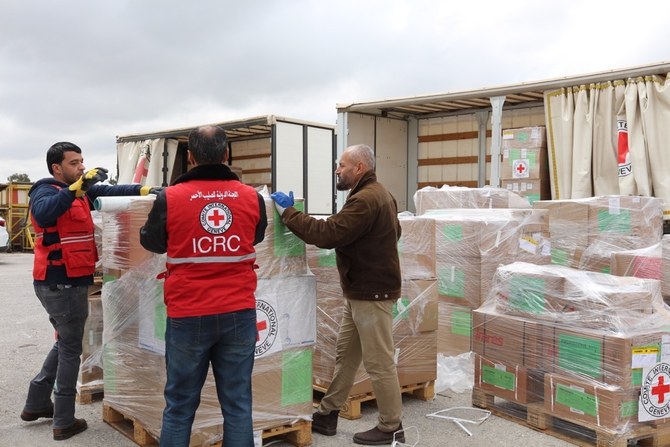
PARIS: France on Friday condemned “in the strongest terms” an attack on an International Committee of the Red Cross convoy in war-torn Sudan that killed two staff and injured three others.
“France calls on all parties to the conflict to respect their obligations under international humanitarian law, which obliges them to protect humanitarian and health staff and guarantee complete, safe and unhindered humanitarian access,” said French foreign ministry spokesman Christophe Lemoine.
The ICRC said gunmen killed two drivers and injured three staff in South Darfur on Thursday as they returned from a humanitarian mission.
A brutal conflict between the Sudanese army led by General Abdel Fattah Al-Burhan and the paramilitary Rapid Support Forces of his ex-deputy Mohamed Hamdan Dagalo has torn the country apart for more than a year.
The war has killed tens of thousands of people and forced millions more to flee their homes in what the United Nations has called the “largest displacement crisis in the world.”
It has also triggered acute food shortages and a humanitarian crisis that has left the northeast African country’s people at risk of starvation.
UN official warns that famine in northern Gaza is already ‘full-blown’

- Israel has killed more than 34,000 Palestinians, according to Gaza’s Health Ministry
- The panel that serves as the internationally recognized monitor for food crises said earlier this year that northern Gaza was on the brink of famine and likely to experience it this month
WASHINGTON: A top UN official said Friday that hard-hit northern Gaza was now in “full-blown famine” after more than six months of war between Israel and Hamas and severe Israeli restrictions on food deliveries to the Palestinian territory.
Cindy McCain, the American director of the UN World Food Program, became the most prominent international official so far to declare that trapped civilians in the most cut-off part of Gaza had gone over the brink into famine.
“It’s horror,” McCain told NBC’s “Meet the Press” in an interview to air Sunday. “There is famine — full-blown famine — in the north, and it’s moving its way south.”
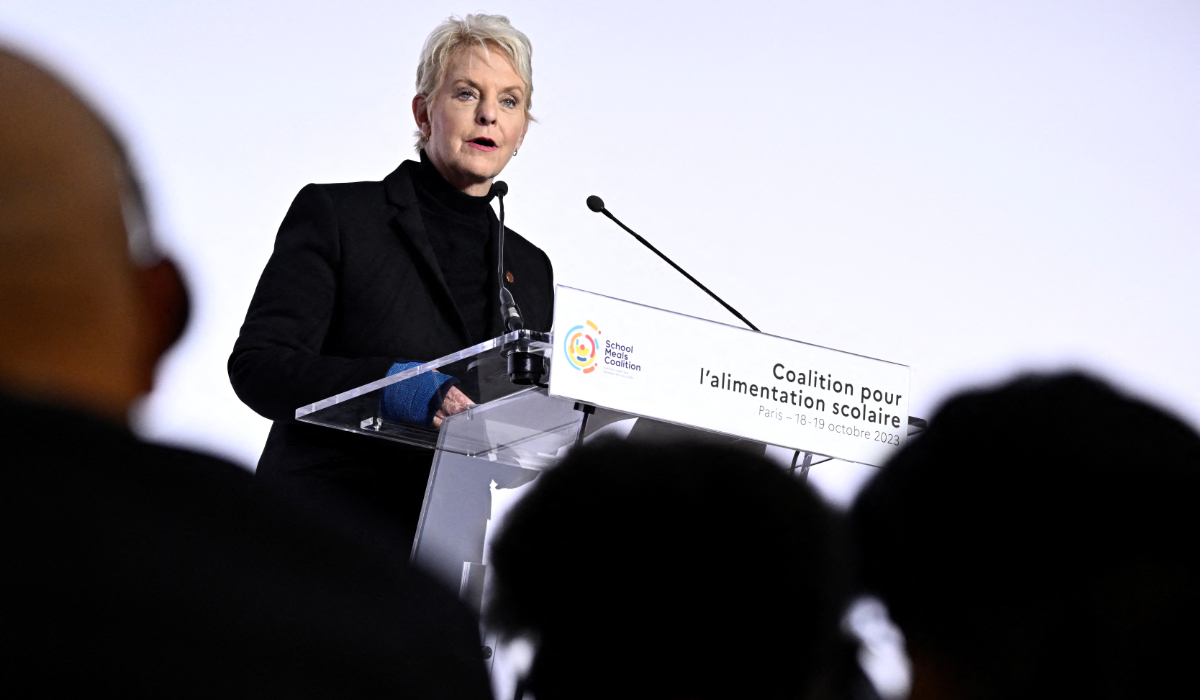
She said a ceasefire and a greatly increased flow of aid through land and sea routes was essential to confronting the growing humanitarian catastrophe in Gaza, home to 2.3 million people.
There was no immediate comment from Israel, which controls entrance into Gaza and says it is beginning to allow in more food and other humanitarian aid through land crossings.
The panel that serves as the internationally recognized monitor for food crises said earlier this year that northern Gaza was on the brink of famine and likely to experience it this month. The next update will not come before this summer.
One of the US Agency for International Development’s humanitarian officials in Gaza told The Associated Press that on-the-ground preparations for a new US-led sea route were on track to bring in more food — including treatment for hundreds of thousands of starving children — by early or mid-May. That’s when the American military expects to finish building a floating pier to receive the shipments.
Ramping up the delivery of aid on the planned US-backed sea route will be gradual as aid groups test the distribution and security arrangements for relief workers, the USAID official said.
The official spoke on condition of anonymity over security concerns for work done in a conflict zone. They were some of the agency’s first comments on the status of preparations for the Biden administration’s $320 million Gaza pier project, for which USAID is helping coordinate on-the-ground security and distribution.
At a factory in rural Georgia on Friday, USAID Administrator Samantha Power pointed to the food crises in Gaza and other parts of the world as she announced a $200 million investment aimed at increasing production of emergency nutritional paste for starving children under 5.
Power spoke to factory workers, peanut farmers and local dignitaries sitting among pallets of the paste at the Mana nonprofit in Fitzgerald. It is one of two factories in the US that produces the nutritional food, which is used in clinical settings and made from ground peanuts, powdered milk, sugar and oil, ready to eat in plastic pouches resembling large ketchup packets.
“This effort, this vision meets the moment,” Power said. “And it could not be more timely, more necessary or more important.”
Under pressure from the US and others, Israeli officials in recent weeks have begun slowly reopening some border crossings for relief shipments.
But aid coming through the sea route, once it’s operational, still will serve only a fraction — half a million people — of those who need help in Gaza. Aid organizations including USAID stress that getting more aid through border crossings is essential to staving off famine.
Children under 5 are among the first to die when wars, droughts or other disasters curtail food. Hospital officials in northern Gaza reported the first deaths from hunger in early March and said most of the dead were children.
Power said the UN has called for 400 metric tons of the nutritional paste “in light of the severe hunger that is pervading across Gaza right now, and the severe, acute humanitarian crisis.” USAID expects to provide a quarter of that, she said.
Globally, she said at the Georgia factory, the treatment made there “will save untold lives, millions of lives.”
USAID is coordinating with the World Food Program and other humanitarian partners and governments on security and distribution for the pier project, while US military forces finish building it. President Joe Biden, under pressure to do more to ease the humanitarian catastrophe in Gaza as the US provides military support for Israel, announced the project in early March.
US Central Command said in a statement Friday that offshore assembly of the floating pier has been temporarily paused due to high winds and sea swells, which caused unsafe conditions for soldiers. The partially built pier and the military vessels involved have gone to Israel’s Port of Ashdod, where the work will continue.
A US official said the high seas will delay the installation for several days, possibly until later next week. The official, who spoke on condition of anonymity to discuss operation details, said the pause could last longer if the bad weather continues because military personnel and divers have to get into the water for the final installation.
The struggles this week with the first aid delivery through a newly reopened land corridor into north Gaza underscored the uncertainty about security and the danger still facing relief workers. Israeli settlers blocked the convoy before it crossed Wednesday. Once inside Gaza, the convoy was commandeered by Hamas militants, before UN officials reclaimed it.
In Gaza, the nutritional treatment for starving children is most urgently needed in the northern part of the Palestinian territory. Civilians have been cut off from most aid supplies, bombarded by Israeli airstrikes and driven into hiding by fighting.
Acute malnutrition rates there among children under 5 have surged from 1 percent before the war to 30 percent five months later, the USAID official said. The official called it the fastest such climb in hunger in recent history, more than in grave conflicts and food shortages in Somalia or South Sudan.
One of the few medical facilities still operating in northern Gaza, Kamal Adwan hospital, is besieged by parents bringing in thousands of children with malnutrition for treatment, the official said. Aid officials believe many more starving children remain unseen and in need, with families unable to bring them through fighting and checkpoints for care.
Saving the gravely malnourished children in particular requires both greatly increased deliveries of aid and sustained calm in fighting, the official said, so that aid workers can set up treatment facilities around the territory and families can safely bring children in for the sustained treatment needed.




